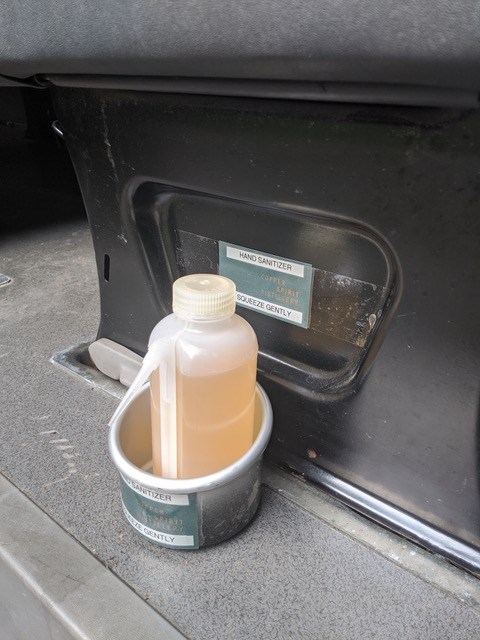It was a mere two days between TransLink’s last Bowen run Friday evening and the cool grey shuttle pulling up at Windjammer and Spyglass at 4:20 a.m. Monday morning.
After TransLink announced last week that all three of Bowen’s public bus routes are suspended as of May 2 as a cost-saving measure during the pandemic, Bowen Island Transportation Society (BTS) put pedal to the metal to create its own on-island bus service to fill the void.
The result is a five-day municipally funded “stop-gap” service between May 4 and May 8. BTS hopes to secure a more sustainable funding stream and model to continue through the summer until the possible return of TransLink service in September.
Less frequent than the usual bus but free
The BTS service is less frequent than the normal Bowen buses––the non-profit is offering four runs in the morning, two runs during the day and four runs in the afternoon––but still timed to meet the ferry. The route is also modified with scheduled stops at Windjammer and Spyglass, Bowen Bay, Tunstall and Reef, Bishops Hill and Eaglecliff Forks. (See the schedule here).

Islanders can track the bus through Glympse on the same account that usually monitors the express bus.
BTS retrofitted the bus with a plexiglass guard for the driver and is encouraging masks, gloves and as much social distancing as possible. They are also asking those who are high-risk or feeling ill not to ride the bus.
The bus is free, though BTS is accepting donations to help continue the service (cash or e-transfers to [email protected]).
Activating the little not-for-profit that can
After news of routes 280, 281 and 282’s suspension date broke last Tuesday, Mayor Gary Ander wrote a letter to TransLink asking that the company reconsider the cuts and voicing concern for essential service workers, islanders with mobility issues and those needing to access essential services given the island’s lack of transportation alternatives. The taxi’s not operating and hitch-hiking isn’t an option during COVID-19.
But as the days were ticking down, focus turned the transportation non-profit that had expertise in running a bus service.
“We had to move really quickly because there's some there's some critical needs on the island,” said BTS’s council liaison Coun. David Hocking.
“We had Wednesday, Thursday, Friday, Saturday and Sunday, to pull all of this together and to secure funding,” said BTS board member Kate Coffey. She took Friday off of her full-time job to work on getting the bus service going. The society’s (unpaid) executive director Julian Barrera and treasurer Richard Smith rounded out the BTS team that brought the service to life.
Coun. Hocking and the Emergency Operations Centre worked with BTS to put together a proposal in three days and Hocking sent the proposal to councillors Friday evening. Council agreed to fund the project for a week so as to give BTS time to make the plan work.
“We’re the small, little not-for-profit that can,” said Coffey Monday morning. “We've had to be super nimble over the last couple of days because hourly things change.”
The society, which took over the Bowen Island Express Bus (Peter’s bus) between Horseshoe Bay and downtown Vancouver last fall, took the relationships and systems they’d developed running the commuter bus and threw it into the on-island iteration. (The express bus is on hiatus due to COVID-19.)
“I think it would have been a huge challenge to set this up having not had the experience of the downtown bus,” said Coffey.
In taking over Bowen Island Express Bus business last year, the society had decided to rent a bus from Sightline, with certifications and insurance built into the cost, rather than purchase their own. BTS decided to go with the same company for this project.
The 11-seater bus rented for this week, usually used by the film industry, comes with all the required licences and insurance, said Smith, and certified drivers are behind the wheel. (BTS is paying a driver this week but are hoping to use volunteers in the future).
The catch is, the new Bowen bus has a weekly price tag of nearly $3,300 said Coffey.
Currency of buses and the search for funding
BIM and BTS has asked province for funding for the bus service but to no avail said BIM’s Emergency Operations Coordinator Jennifer McGowan.
“We applied for a whole series of grants but none of that worked,” said Coun. Hocking.
The Bowen Island Community Foundation Resiliency Fund could be a hope but this is a bit outside of its terms of reference said McGowan.
The current hope is for TransLink to allow BTS to use one of Bowen’s regular buses, and accompanying licence and insurance, with a volunteer (certified) bus driver, which would bring the price tag down to $50 a day said Coffey. “They haven't said no,” said Coffey of TransLink’s response.
“We're a non-profit society with basically no savings so we can't keep going for any time beyond our mandate,” said Smith. “But for now, we have enough to get us through to Friday and we'll see how it goes.
“We're working like crazy with all kinds of people.”
Who rides the bus?
Bowen’s public bus usage had dropped to 20 boardings a day or fewer TransLink said when it cut the service. Bowen’s route 280 route averaged 250 boardings on the average weekday in 2017.
Bowen Island Municipality put out a call last week asking after islanders’ transportation needs in light of the cuts and received 28 responses said McGowan.
“It's tough because the number of people affected might not be very high but the effect is quite significant,” said McGowan. Bus users included people needing to get to regular medical appointments, home care workers, youth, other commuting essential workers, those needing to do grocery shopping and more.
This on-island need was apparent for the BTS team who are well-acquainted Bowen’s commuters from the express bus. Some of these commuters are essential workers.
“We had a vivid picture in our minds of what that meant and how it was necessary for us to step in,” said Smith.
BTS is also concerned about the on-island home-care workers getting to clients.
“My mother in Ireland had a caregiver and if that caregiver didn't arrive, my mother couldn't get out of bed that morning, couldn't get up, washed, dressed, have a meaningful day,” said Coffey. “That's really what's driving us.”
“And I think importantly, those caregivers are quite invisible in the community,” said Smith. “They're even less visible than the 5 a.m. commuters who kind of form a little club.”
“They go separately to their various places and enable the lives of these people with either [age-related] or other disabilities.
“That was just going to come to a screaming halt.
That was just the first hurdle
“So many people came together to make this happen but we’re really conscious that is for one week only and the work is not done yet,” said Coffey. “This was a major hurdle for us to get it up and running. But now the big push is to secure the funding and convince TransLink and we'll go from there.”
Coffey said that the goal is to be able to sustain a bus service until TransLink reinstates its 280, 281 and 282 runs.
But those involved––from BTS, to the municipality, to council––are pleased with getting the service going with less than a week’s notice.
“I saw the bus go by my front door this morning and I was like, well, isn't that a thing of beauty out there,” said Coffey.



